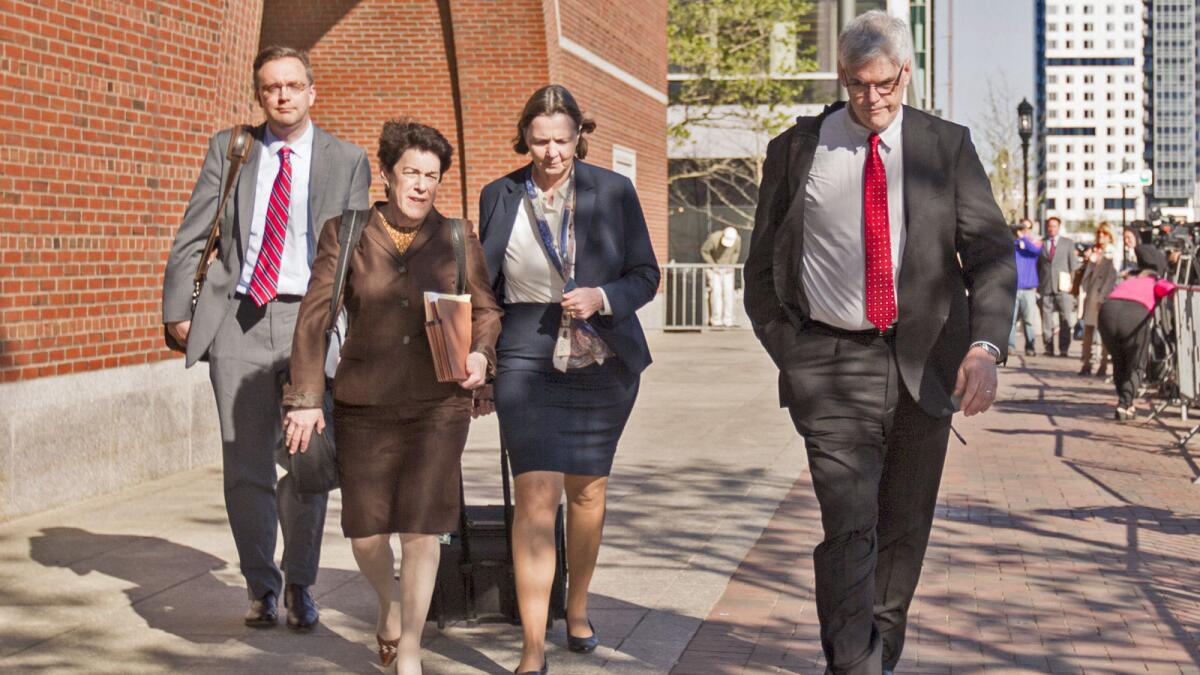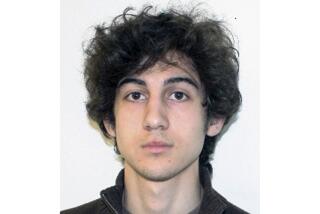Boston bombing jury’s questions hint at progress but also challenges

Members of the legal defense team for
Reporting from Boston — In its first full day of deliberations Thursday, the Boston Marathon bombing jury asked the judge two questions as it debated a punishment for Dzhokhar Tsarnaev, a sign of how difficult its work might be.
Jurors sent a note to Judge George A. O’Toole Jr. indicating they were confused over the issue of “aiding and abetting,” and asking whether they were supposed to decide if Tsarnaev personally intended to kill people in the April 2013 bombings or simply was following the orders of his older brother, Tamerlan Tsarnaev.
The judge discussed the matter with the lawyers from both sides, and then advised the jurors to follow his earlier instructions and let the testimony and evidence guide them in their decision-making.
A second question from the jurors asked how they were to fill out some of the sentencing verdict forms. Again, the judge asked them to follow his prior instructions in that any death sentence must be filled out unanimously by all of the jurors.
The jury of seven women and five men deliberated about an hour Wednesday after hearing closing statements from prosecutors who want a death sentence for the 21-year-old Russian immigrant and from defense lawyers hoping for an alternative punishment of life in prison with no parole.
The panel must vote on separate aggravating and mitigating factors in reaching a decision on Tsarnaev’s sentence. According to the judge’s instructions, they then are to decide which factors should be given the most weight, and then make their decision.
Because it is a death penalty case, prosecutors have the higher burden and the jury must be unanimous in approving any of their aggravating factors. Their factors note that Tsarnaev placed his bomb near a row of small children, that he has shown no public remorse, that the bombings were a terrorist attack, and that a police officer was killed in a subsequent manhunt.
The mitigating factors put forth by the defense can be approved by a simple majority; they need not be unanimous. They include evidence that Tsarnaev was manipulated by his radicalized older brother and that he came from a largely dysfunctional family from the war-torn Chechen region.
The jurors could decide that a death sentence would send a strong warning against future terrorists, especially because no other convicted terrorists have landed on death row in the post-Sept. 11 era.
Or, being from a large Catholic community in an anti-death-penalty state, some of the jurors might go for a life sentence after hearing the final defense witness, Sister Helen Prejean, testify Monday that Tsarnaev told her the victims “did not deserve to suffer” in the bombings.
Three people were killed by the two pressure cooker explosions at the race finish line. More than 260 were injured
Tsarnaev was found guilty last month on all 30 charges in the case, including 17 that carry a potential death penalty .
On Twitter: @RickSerranoLAT
More to Read
Sign up for Essential California
The most important California stories and recommendations in your inbox every morning.
You may occasionally receive promotional content from the Los Angeles Times.











